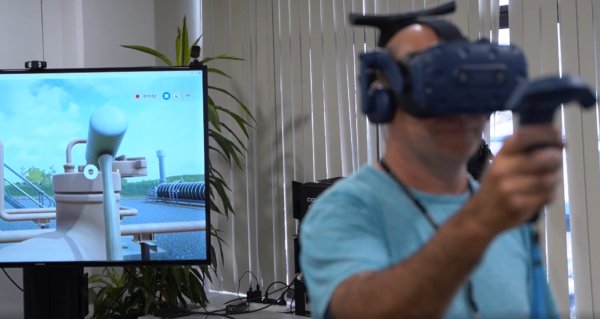First Gas, operator of more than 2,500 km of high-pressure gas transmission pipelines and 4,800 km of gas distribution networks in the North Island, turned to Waikato virtual reality (VR) specialist Company-X to design and develop a custom-built VR training programme for high-risk procedures.

First Gas staff member trying the new technology. Image credit: Company-X
The Company-X VR team developed a solution for First Gas through ideation following an agile software development process. Key members of the Company-X team included augmented and virtual reality specialist Lance Bauerfeind, project manager Dilan Prasad, and interactive artist Wonkee Kim. The Company-X team worked closely with First Gas Information Services project manager Reuben Uncles.
The minimum viable product took 12 weeks to design and develop, with Uncles receiving weekly updates from Prasad and his team.
Company-X used VR technology to replicate, in exacting detail, the high-risk procedure for emergency venting of a ruptured pipeline before maintenance could be carried out.
“Virtualising the emergency venting process removed all risk to the First Gas team,” Uncles said.
Company-X built a true-to-life VR model of the Te Kowhai DP Main Line Valve (MLV) in the Waikato. The team used point cloud scanning technology and as-built drawings to collect accurate location and dimension data of all pipework and components.
“The reactions of people who tried the VR headset in the First Gas VR Training scenario conveyed a sense of amazement as they explored the environment and interacted with the valves, control panel button and the tools,” Uncles said of the demonstration day in Bell Block, Taranaki.
“There were no reports of dizziness, motion sickness, nausea or any other ill-feeling as can be attributed to older VR technology. The consensus was that it was a very realistic life-like world with ‘good effects’, that makes for a viable training environment.
Company-X developed many reusable artefacts in the process which First Gas can use in future VR training scenarios. First Gas field technicians suggested further simulations, such as scenarios for unexpected events on the gas network, training on new slam-shut valves, servicing and overhauling regulators.
Uncles said, “Future projects and scenarios are limited only by the imagination and ideas of the people within First Gas.
“They provide an engaging, fun and cost-effective way of exposing our people to what would normally be a high-risk task.
“The delivered products possessed the ‘wow’ factor we wanted to show that training for high-risk activities can now be virtualised in a fun and engaging manner, removing almost all risk to our people and assets in a cost-effective manner.”
